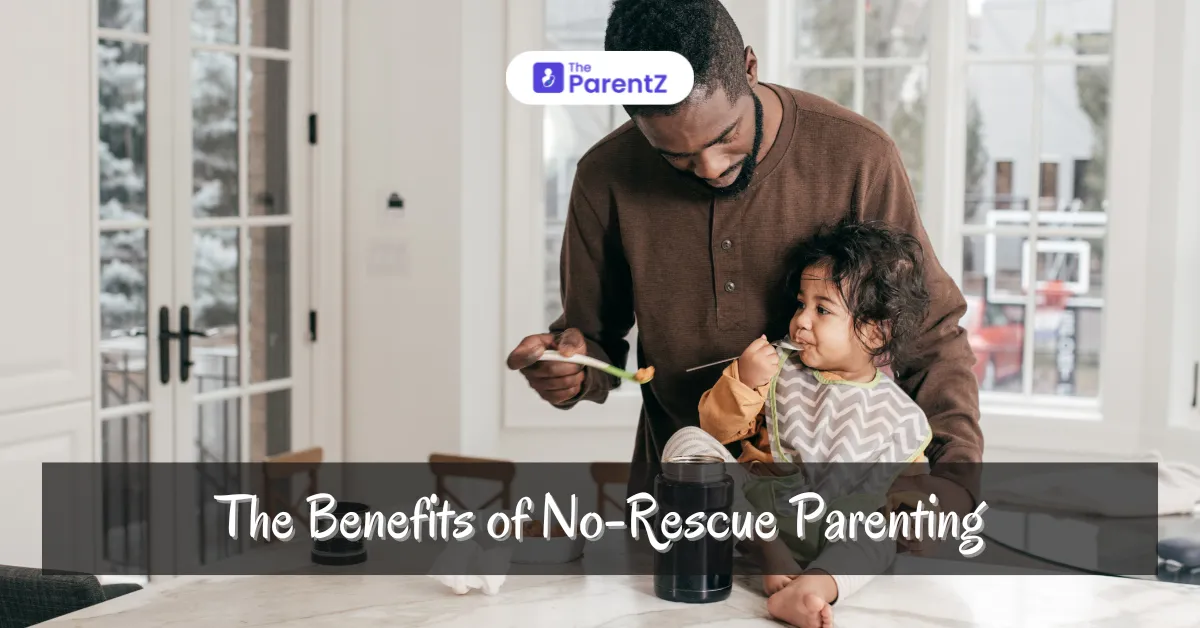You know that moment when your child forgets their homework, and you're tempted to rush it to school? Or when they're struggling with a puzzle, and your hands itch to just show them how it's done? We've all been there. But what if we told you that by resisting these rescue impulses, you're actually giving your child an incredible gift?
Let's explore no-rescue parenting, an approach that's gaining traction among parents who want to raise capable, confident kids. And trust us, it's not about being mean – it's about being smart with our support.
What Is No-Rescue Parenting?
Think of it as being a safety net with holes – big enough to let your child experience natural consequences, but strong enough to catch them when there's real danger. It's about stepping back from solving every little problem your child encounters, allowing them to face age-appropriate challenges and figure things out for themselves.
The Science Behind Letting Kids Struggle
Here's something fascinating: research in neuroplasticity shows that when children work through challenges, their brains literally build new neural pathways. It's like creating their own mental superhighways for problem-solving. Studies from the University of Pennsylvania have found that children who regularly face and overcome obstacles develop stronger executive function skills – those crucial abilities to plan, focus, and juggle multiple tasks.
Key Benefits of No-Rescue Parenting
Emotional Resilience
Life is filled with ups and downs, and resilience is key to navigating these fluctuations successfully. Children who experience setbacks without parental intervention learn that failure is not the end but rather a steppingstone toward success. They become more adaptable and better equipped to handle future challenges. Research indicates that kids who face difficulties without rescue tend to bounce back more quickly when faced with adversity later in life.
Problem-Solving Superpowers
Allowing children to solve their problems equips them with critical thinking skills. When faced with a challenge, they must analyze the situation, consider options, and make decisions. This process sharpens their ability to think critically and creatively. For example, if your child struggles with a difficult puzzle, instead of stepping in to help immediately, you can ask guiding questions that prompt the child to think through the problem themselves.
Independence and Self-Reliance
When children are allowed to tackle challenges on their own, they learn to rely on themselves. This independence is important as they grow older and face more complex life situations. For instance, if your child forgets their homework, instead of rushing to deliver it, you can encourage them to face the consequences and learn from the experience. This builds confidence and self-sufficiency.
Emotional Growth
When children are allowed to experience disappointment or frustration, they learn how to manage their emotions effectively. Instead of shielding them from negative feelings, you can help them communicate these emotions and find constructive ways to cope. This emotional intelligence is important for building strong interpersonal relationships as they grow older.
Accountability
When you refrain from rescuing your children from every mistake or challenge, you instill a sense of accountability in them. Children learn that their actions have consequences, which promote responsibility. For instance, if your child neglects chores and faces natural consequences—like losing privileges—they are more likely to remember their responsibilities in the future.
Social Skills
Navigating social interactions is another area where no-rescue parenting shines. Children often encounter conflicts with peers; by stepping back and allowing them to resolve these issues independently, you are helping them develop negotiation skills and empathy. For example, if two friends argue over a toy, instead of intervening immediately, guide your child on how to communicate effectively and find a resolution.
Parent-Child Relationships
Interestingly, no-rescue parenting can strengthen the bond between parent and child. When you trust your children to handle situations independently, it conveys confidence in their abilities. This trust encourages mutual respect and open communication within the relationship. Children feel supported rather than controlled, leading to healthier dynamics as they grow.
How to Start (Without Feeling Like a Bad Parent)
Let's be honest – watching our kids struggle isn't easy. Here's how to begin:
Start Small
- Let them pack their own backpack (even if it means forgetting something)
- Have them make their own lunch (even if it's not perfectly balanced at first)
- Let them handle peer conflicts (unless there's bullying or safety concerns)
Create a Supportive Environment
Instead of rushing to solve problems, try:
- "What do you think you could do about that?"
- "Would you like to talk through some possible solutions?"
- "That sounds tough. How are you thinking of handling it?"
Common Parent Concerns
But What About Their Self-Esteem?
Self-esteem built through overcoming challenges is far more powerful than the kind we create by clearing all obstacles. Think of it like a muscle – it needs resistance to grow stronger.
Won't They Fall Behind?
Short-term setbacks often lead to long-term gains. A forgotten homework assignment in elementary school is a much better learning opportunity than a missed college deadline.
What If They Fail?
This is where the magic happens! Small failures in a supportive environment teach kids that:
- Mistakes are normal and survivable
- There's usually a way to fix things or do better next time
- They're capable of handling disappointment
Conclusion
No-rescue parenting isn't about abandoning our kids to figure everything out alone. It's about being present, supportive, and wise enough to know when to step back. It's about raising kids who don't just survive in the world – they thrive in it.
The next time you feel that rescue urge, take a deep breath. Ask yourself: "What's the worst that could happen if I don't step in?" Often, the answer is exactly what your child needs to grow stronger, more capable, and more confident.
Remember: Short-term discomfort leads to long-term growth. Every time you resist the urge to rescue, you're saying to your child, "I believe in you. I know you can handle this."








Be the first one to comment on this story.